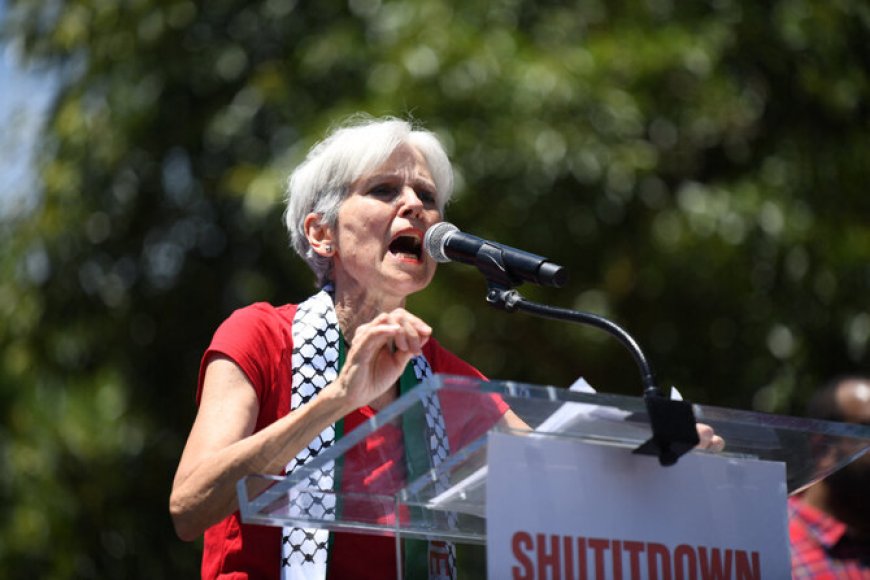No Lesser Evil: Jill Stein's Argument Against America's Fragmented Political System

Once more upsetting the U.S. political scene is Jill Stein, the Green Party's presidential nominee. Defiantly protesting in June 2024 outside the White House for a pro-Palestinian demonstration, Stein made plain her opinion on American political situation. Between Democratic nominee Vice President Kamala Harris and her Republican opponent former President Donald Trump, she sees "no lesser evil." Beyond the conventional rhetoric of third-party candidates, Stein's critical analysis of both major parties strikes firmly on the most delicate political issue of the moment: U.S. support for Israel.
Given the United States enmeshed in two wars—one in Gaza and another along the Israel-Lebanon border—Stein's critique is especially moving. Harris is losing support of Arab and Muslim voters in important battleground states as the Democratic Party's relentless support of Israel contrasts with mounting dissension within its own base. Stein claims that Harris's refusal to advocate a ceasefire in Gaza and Lebanon as well as her military support of Israel are alienating an electorate crucial for Biden's 2020 success.
The stats are not lying. Polls reveal Stein receiving just 1% of the vote across the country. Her popularity is far greater, though, in states like Michigan, Wisconsin, and Arizona—key battlefields with significant Arab-American populations. According to an August Council on American-Islamic Relations poll conducted in Michigan, Stein obtained 40% of the Muslim vote—far more than Harris or Trump. Stein herself is aware she is not likely to win, but her presence is sufficient to remove important votes that might be crucial in a close call election.
But this goes beyond the Arab and Muslim vote here. Beyond any one demographic, Stein's criticism of the Democratic Party's rejection of its conventional working-class base strikes resonance. Black men, Latinos—many of whom have felt left behind by the Democratic establishment's neoliberal policies—are disillusioned with both major parties. Union members are also disillusioned. Stein contends that the Democrats keep promising these groups just to turn on them once in power, therefore betraying them.
One could clearly sense the unhappiness among workers. Civil liberties are under siege; earnings are flat; the rent is excessive. Though they are not new, these problems have gotten worse under the Biden- Harris presidency. Beyond only foreign policy, Stein's program of a lasting truce in Gaza and an arms embargo on Israel reflects her larger criticism of a society that gives military expenditure top priority over the welfare of its people. Trump's GOP is not friend to the working class, but Stein contends that the Democrats' disappointment of their pledges feels like a worse betrayal.
Harris's deteriorating support among important groups clearly shows this disenchappiness. Many Arab and Muslim voters are rejecting the Democratic Party despite efforts to attract them—such as her recent meeting with Muslim leaders in Michigan and Minnesota Governor Tim Walz's outreach. Some, like Farah Khan of the "Abandon Harris" movement, have promised to vote for a third-party candidate even while it means unintentionally supporting Trump. "We are definitely in the numbers to take somebody out of office, but we may not be in a sufficient number to place somebody in office," Khan remarked.
Harris's candidacy loses more than just Arab-American voters. Growing tired of a party they believe no longer speaks to their concerns, union workers and other conventional Democratic supporters are Stein's message addresses these voters: no amount of outreach or last-minute pandering will solve the basic brokenness of both main parties.
Still, the Democrats are firmly anchored in a political arithmetic that holds minority and working-class voters without alternative choice. Although the GOP's embrace of far-right populism under Trump is clearly risky, Stein's point of view—that Democrats have routinely failed to live up to their promises—resonates with a rising number of Americans who feel politically stranded. This provides a target for outside candidates like Stein to seize.
Stein's conviction that between Trump and Harris there is no "lesser evil" is a stinging critique of the American political establishment. Her agenda stems from the conviction that both main parties are extending the same cycles of violence, inequality, and disappointment, even if it is improbable to guarantee her a victory. Stein's message is clear: there is another path forward for voters weary of having to decide between terrible and worse.
For those who worry about the very actual repercussions of another Trump presidency, this presents a serious conundrum, though. Stein concedes that another four years of Trump would be "terrible." However, as she contends, under Harris, four more years of Democratic government would follow. "This is a really dire situation that will be continued under both Democrats and Republicans," Stein remarked. "We thus say that this race lacks any lesser evil."
Stein's campaign is easily written off as a long-shot bid from a fringe candidate. Her criticism, however, speaks to a deeper annoyance with the two-party structure that progressively fails to reflect the concerns of common Americans. Her comments might appeal to a larger portion of the voters than the Democrats' or Republicans' are ready to accept as the 2024 election draws near.













































